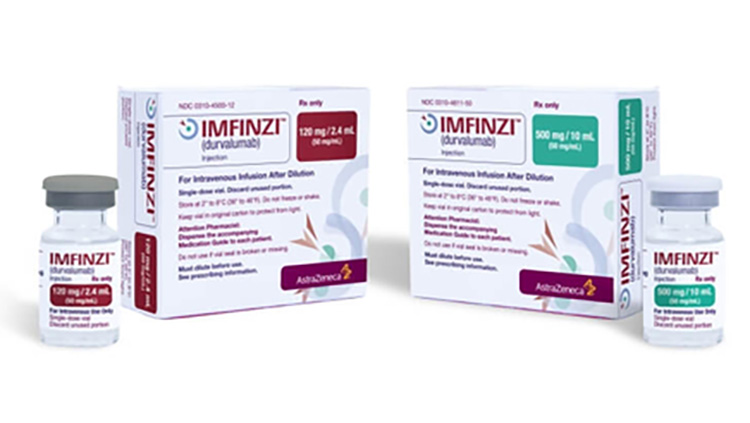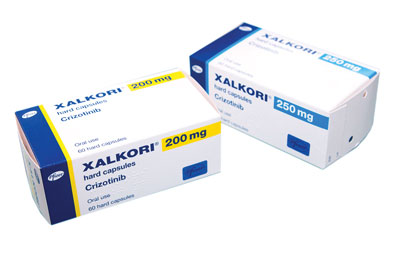Imfinzi (durvalumab) vs Xalkori (crizotinib)
Imfinzi (durvalumab) vs Xalkori (crizotinib)
Imfinzi (durvalumab) is an immune checkpoint inhibitor specifically targeting the PD-L1 protein, used primarily for the treatment of certain types of urothelial carcinoma and non-small cell lung cancer (NSCLC). Xalkori (crizotinib), on the other hand, is a targeted therapy that inhibits anaplastic lymphoma kinase (ALK) and is used for NSCLC patients who have specific genetic mutations, namely the ALK or ROS1 gene rearrangements. The choice between Imfinzi and Xalkori would depend on the patient's specific type of cancer, its genetic makeup, and the overall health and treatment goals of the patient, as determined by oncologists through comprehensive diagnostic testing.
Difference between Imfinzi and Xalkori
| Metric | Imfinzi (durvalumab) | Xalkori (crizotinib) |
|---|---|---|
| Generic name | Durvalumab | Crizotinib |
| Indications | Non-small cell lung cancer, urothelial carcinoma | Non-small cell lung cancer, ROS1-positive, and ALK-positive metastatic NSCLC |
| Mechanism of action | PD-L1 inhibitor | ALK and ROS1 tyrosine kinase inhibitor |
| Brand names | Imfinzi | Xalkori |
| Administrative route | IV infusion | Oral |
| Side effects | Fatigue, musculoskeletal pain, constipation, decreased appetite, nausea, peripheral edema, urinary tract infection | Visual disorders, gastrointestinal effects, edema, elevated transaminases, fatigue, decreased appetite |
| Contraindications | Hypersensitivity to durvalumab or any of its excipients | Hepatic impairment, QT interval prolongation, bradycardia |
| Drug class | Antineoplastic, immune checkpoint inhibitor | Antineoplastic, kinase inhibitor |
| Manufacturer | AstraZeneca | Pfizer |
Efficacy
Imfinzi (Durvalumab) Efficacy in Lung Cancer
Imfinzi (durvalumab) is an FDA-approved immunotherapy drug used for the treatment of patients with certain types of lung cancer. Specifically, it is indicated for the treatment of patients with unresectable Stage III non-small cell lung cancer (NSCLC) whose disease has not progressed following concurrent platinum-based chemotherapy and radiation therapy. Durvalumab is a programmed death-ligand 1 (PD-L1) blocking antibody, which works by helping the immune system in detecting and attacking cancer cells. Clinical trials have demonstrated that durvalumab significantly improves progression-free survival (PFS) in this patient population. The PACIFIC trial, a pivotal phase III study, showed that durvalumab treatment resulted in a median PFS of 16.8 months compared to 5.6 months for placebo, which was a substantial improvement.
Xalkori (Crizotinib) Efficacy in Lung Cancer
Xalkori (crizotinib) is another targeted therapy approved for the treatment of NSCLC. It is specifically used for patients whose tumors are anaplastic lymphoma kinase (ALK)-positive or ROS1-positive. Crizotinib is an ALK and ROS1 inhibitor, and its efficacy has been demonstrated in several clinical trials. For ALK-positive NSCLC, crizotinib has been shown to improve response rates and prolong PFS when compared to standard chemotherapy. In a key clinical trial, the median PFS for patients treated with crizotinib was 10.9 months, compared to 7 months for those who received chemotherapy. Additionally, crizotinib has shown efficacy in patients with ROS1-positive NSCLC, with high response rates and durable responses.
Comparative Efficacy in Lung Cancer
While both Imfinzi (durvalumab) and Xalkori (crizotinib) are effective treatments for specific subsets of lung cancer, their mechanisms of action and indications differ. Durvalumab is used in the context of immunotherapy for Stage III NSCLC patients who have not progressed after chemoradiation, whereas crizotinib targets genetic alterations in ALK or ROS1 for advanced NSCLC. Both medications have altered the landscape of lung cancer treatment by providing options that are tailored to the molecular characteristics of the cancer or the stage of disease progression.
Conclusion
Overall, the efficacy of Imfinzi (durvalumab) and Xalkori (crizotinib) in the treatment of lung cancer has been well established in clinical trials. These medications offer hope for improved outcomes in patients with certain types of lung cancer, emphasizing the importance of molecular testing and personalized medicine in the management of this disease. As with any medication, the use of durvalumab and crizotinib should be guided by a healthcare professional, taking into account the specific characteristics of the patient's cancer and overall health status.
Regulatory Agency Approvals
Imfinzi
-
European Medical Agency (EMA), European Union

-
Food and Drug Administration (FDA), USA

-
Health Canada

-
Therapeutic Goods Administration (TGA), Australia

-
Medsafe (NZ)

Xalkori
-
European Medical Agency (EMA), European Union

-
Food and Drug Administration (FDA), USA

-
Health Canada

-
Pharmaceuticals and Medical Devices Agency (PMDA), Japan

-
Therapeutic Goods Administration (TGA), Australia

Access Imfinzi or Xalkori today
If Imfinzi or Xalkori are not approved or available in your country (e.g. due to supply issues), you can access them via Everyone.org.
How it works

Make an enquiry
Choose the medicine you want to buy, answer a couple of questions, and upload your prescription to speed things up. We’ll get back to you within 24 hours.


Make an enquiry
Choose the medicine you want to buy, answer a couple of questions, and upload your prescription to speed things up. We’ll get back to you within 24 hours.


Breeze through the paperwork
We'll guide you through the required documents for importing unapproved medicine, ensuring you have all the necessary information.


Get a personalized quote
We’ll prepare a quote for you, including medicine costs and any shipping, administrative, or import fees that may apply.


Receive your medicine
Accept the quote and we’ll handle the rest - sourcing and safely delivering your medicine.

Some text on this page has been automatically generated. Speak to your physician before you start a new treatment or medication.
Let's talk
If you have any questions, call us or send us a message through WhatsApp or email:
Contact us




